The cannabis plant is an expression of feminine energy in its purest form. The industry remains male-dominated, much like other agricultural sectors, with only 17 percent of women in cannabis working in cultivation according to the Women in Cannabis Study. However, there are more women growers making waves in the industry today than ever before.
We spoke with a few of these trailblazers to learn more about what inspires them, the challenges they face, and their advice to the female farmers of tomorrow.
Tina Gordon, founder and owner, Moon Made Farms, California
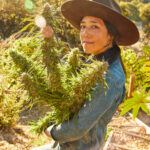
Tina Gordon found herself in the Emerald Triangle 15 years ago as part of a documentary film crew. Inspired by the majesty of the plant’s full expression, she felt called to cultivate full-time and soon made Northern California her home. Gordon quickly became a staple of the Humboldt County community, advocating for legacy growers throughout the region. A Sun + Earth certified operation, Moon Made Farms is focused on regenerative agriculture that harnesses lunar energy.
What do you love most about cultivating cannabis?
“Cultivating cannabis has completely changed my life, altered my perspective about living systems, and awakened me to living on a living planet. It’s a daily inspiration to continue moving forward to share this experience with others.”
What is the biggest challenge?
“The greatest challenges we face as cultivators are the greatest gifts, which stem from working with nature. Nature is all powerful and it’s our job and our role to respond to the natural forces to cultivate these plants in harmony with daily subtle natural shifts across all forces.”
“As a cultivator as a career and vocation, our greatest challenges continue to be federal prohibition and state regulations that limit our access to doing business and being a functioning business. As regenerative sungrown craft cultivators, our audience is presently limited as indoor and massive outdoor have become industry standards. I’m interested in seeing increased public access to quality craft cannabis that will provide people with the highest possible benefits.”
Dr. Jade Stefano, co-founder, CEO, and medical director, Puffin Farm, Washington
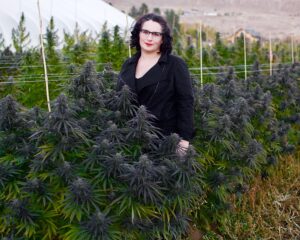
What advice do you want to share with other women growers?
“For women interested in starting up commercially, it is important to be realistic about costs and prices to be expected in a regulated market. The costs will be way over your initial estimates and the price you receive will be way under. We are seeing this play out in multiple states. The demand for craft products has not yet matured, making small and medium-scale craft production difficult to sustain. It is important to have excellent branding and to be prepared for a long haul roller coaster ride commitment.”
Dr. Natasha Khallouf, DAOM, founder, CEO, and farmer of Agricola Flower and Nursery
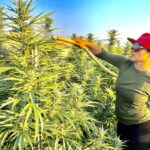
What advice do you have for new women growers?
“Never do anything just for money. Do it for the love. Get really comfortable with being alone and you will never be lonely, and see the company of those that don’t deserve your presence. Devote time to learning your craft, spend time with mentors, elders, and people who are passionate about sharing their love of the plant. Learn how to do hard things you thought you couldn’t do.”
What are the biggest challenges for cultivators like yourself?
“Most of us family farmers are self-funded and land access is a major issue that affects minorities such as myself with limited or no intergenerational wealth.
“Those with investment funds often have that bit of cushion that will see them through when the going gets really hard. And it’s currently really hard. I shed tears the other day when I read that the only other licensed female family farmers in my county had thrown in the towel. I am now the longest-running permit in my county and the only licensed female. Some might be proud but I am sad to hold this title.”
Bridgette Ponder, owner and master grower, Grounded Gardens, Minnesota
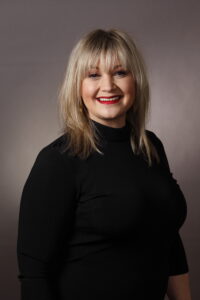
What inspired you to start growing?
“Buying cannabis on the legacy market you don’t always know what you’re getting and how it was grown. I want to help others through cannabis, and cultivating is the first step to making complete seed-to-shelf products without any chemicals. I like to look at it like the farmer’s market model of cannabis: know your farmer, so you know what’s going in and on your body!”
What advice do you have for women who may be interested in cultivation?
“Just start! Don’t let anyone tell you that you can’t do something you want to. Start small and build over the years. The plant will tell you what it needs: learn to read the leaves and the plant, and research what it is telling you.”
Selena Rowan, CEO and chief herbalist, Midnight Gardens
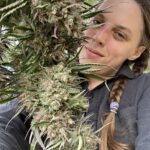
What inspired you to start growing?
“When I moved to Humboldt in 2006 at age 19 with my partner, our goal was to learn from the elders of the back-to-the-land movement — we wanted to learn how to create a way of living that increased the earth’s capacity to sustain life, and cannabis was a teacher for us and also like a loving parent who took care of us during that time.”
What advice do you have for other women growers?
“Grow medicine for your family, for your friends, for yourself, and remember that the goal is the healing of the earth; the healing of our hearts, minds, and bodies; and freedom for all cannabis prisoners. This plant isn’t an easy cash crop anymore, and industrial agriculture and capitalist pirates may succeed in the short term to prevent family farms from making a living off this plant. That said, the future is unwritten, and they’ll never succeed in severing our spiritual connections to the plant itself.”
Kat King, founder and co-owner, Petal Consultants, Mississippi
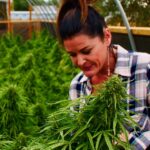
What do you love most about growing cannabis?
“My favorite part of cultivating is watching the girls mature into ladies and thrive. That feeling when you first lay eyes on them each day.”
Karen Rumics Averill, the boss, Cannaflage Designs, Oregon
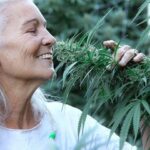
What inspired you to become a caregiver?
“When Oregon approved medical in 1998, we realized that we could help others and started growing for 12 other patients. During that time, we saw the benefits our patients received by reducing their dependence on pharmaceuticals and increasing mobility. One patient had not been able to bead or do leather work for 20 years, yet two years after we started growing medicine for him, he was able to continue his passion. Seeing the medicinal benefits is so rewarding. My husband has been able to go off Oxycontin, Vicodin, and Enbrel as a result, and I take no pharmaceuticals at all.”
What’s your favorite part of cultivating?
“My favorite part of cultivating is after all the hard work is done and I can wander among the plants surrounded by butterflies, dragonflies, and ladybugs, watching them grow and using all my senses to appreciate the plant. We grow outdoors only so our plants receive full sun, fresh air, and clean water.”
Lorelie Sandomeno, founder, co-owner, and CEO, Sunrise Mountain Farms, California

What do you love about cultivating cannabis?
“Communing with the plant. Pheno-hunting and creating new cultivar combinations is fun and rewarding. Nourishing vibrant living soils to provide the most abundant nutrient uptake for our plants so they may reach their fullest potential under the full spectrum of sunshine. Learning about and being creative with natural farming techniques, making our own plant nutrients, and working to create a healthy, balanced ecosystem are also my favorite parts of cultivating.”







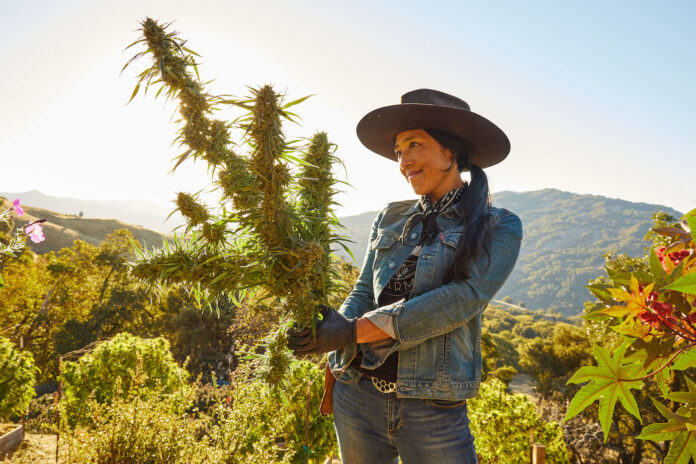





[…] sales in New York, and this two-year promise to adult-use conditional cultivators will make sure these farmers can reap the benefits of this growing […]
[…] are an especially annoying pest for cannabis cultivators. These insects feed on plant juices from foliage and stems, excreting a sap-like substance. This […]
[…] Best advice: […]
[…] the struggles of craft farmers up and down the West Coast now serve as a cautionary tale for small cultivators across the […]
[…] important to note that not all grow lights are created equal, and each cultivator has unique needs. By choosing the right grow light at the start and spending the time dialing in spectrum and […]
[…] Women-owned cultivator Clone Goddess’s new eponymous flower line bounded onto the retail scene in folding cartons that allow consumers to peek at the product inside the package through a corner-wrapping window. Cradled inside a clear pouch, the delicate buds are protected from harm yet easily visible. […]
[…] their full genetic potential. With a small array of industry-focused sensors or handheld devices, forward-thinking cultivators gain access to valuable insights into the long list of factors directly impacting their garden’s […]
[…] cultivators do have several options for boosting CO2 levels in the garden. From generators to biodynamic soils, […]
[…] now, triploids have been a rare, random, and special occurrence in cannabis flower, but today’s commercial growers are embarking on intentional ways to produce nearly seedless cannabis for a few different […]
[…] of the highlights of Las Vegas Cannabis Week for many of the industry’s women (and their allies) is the annual Blunt Brunch. Hosted at the IPEC, the gathering of more than 350 […]
[…] a farmer’s standpoint, a huge error I commonly come across is growers failing to break their cannabis leaves all the way off at the stem,” Vaserling […]
[…] from sales and marketing to consulting with growers and facilities across the U.S. As a former commercial cultivator in Nevada, he was an early LED adopter and is intimately familiar with the issues growers confront […]
[…] Female-owned and operated, Mecca Mid City serves as the home base for Mecca products, which are designed to speak to every type of cannabis consumer. The interior is low-lit and stylish: a weed oasis for the city’s creative scene. […]
[…] and creative director. “I’m a musician, and our whole team really loves music. We look at the breeders and cultivators as artists too. That’s our mission: to support artists and creatives and keep that lifestyle component tied in, […]
[…] now, triploids have been a rare, random and special occurrence in cannabis flower, but today’s commercial growers are embarking on intentional ways to produce nearly-seedless cannabis for a few different reasons. […]
[…] visit, so customers likely will not expect to go home with anything larger than an ounce of flower. Cultivators and distributors, however, frequently deal in half-pounds and full pounds when selling to […]
[…] a whole host of reasons, it matters very much. Cultivators want to promote their crop as organic, a label beyond reach until the U.S. Department of […]
[…] between male and female consumers who exclusively use smoked forms of cannabis, pointing to a stronger stigma for female cannabis smokers and an opportunity for brands to provide attractive alternatives for this demographic. According to […]
[…] state colony-forming unit (CFU) limits. Failing microbial testing can have severe consequences for commercial growers, including lost revenue, expensive fines, liability litigation, reputation damage, and even the […]
[…] regulators with the newly created Office of Cannabis Management will oversee licensing for commercial cannabis growers, retailers, and delivery services. On-site consumption will be allowed at certain permitted events. […]
[…] are several reasons why autoflower seeds are beneficial to cultivators. In addition to their ease of use, auto seeds tend to be more […]